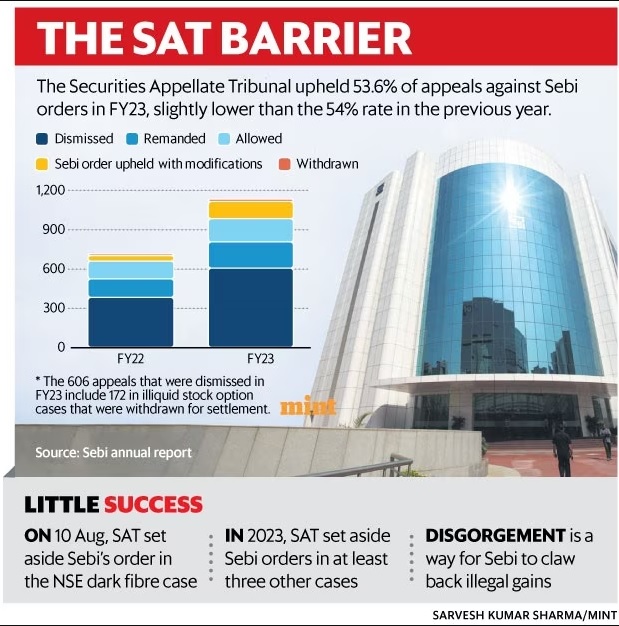Sebi disgorgement orders hit SAT wall
Aug 13, 2023
Disgorgement orders issued by the Securities and Exchange Board of India (Sebi) continue to sputter at the appeals tribunal, exposing flaws in how the stock-market regulator attempts to recover illegal gains.
On 10 August, the Securities Appellate Tribunal (SAT) set aside Sebi’s disgorgement order in the National Stock Exchange (NSE) dark fibre case. In 2023 so far, the tribunal has set aside disgorgement orders in at least three other cases, including the NSE co-location case, the Satyam scam, and a case pertaining to actor Arshad Warsi.

Disgorgement is a process through which Sebi claws back illegal gains made by market participants through fraudulent means. Also, in cases where actions by market manipulators cause losses to public investors, Sebi recovers the amount lost from the guilty. However, there is no uniform procedure to calculate such gains, and each adjudication officer takes his own call. Often, courts have held that the calculations made by Sebi officers have deviated from the principles of equitable approach, leading them to be overturned, legal experts said.
“Sebi has repeatedly deviated from the core disgorgement principle, which mandates quantifying ascertainable gains or avoided losses. Straying from this equitable approach, Sebi occasionally relies on total trade value, notional values, presumptions and even includes salary or bonus income. What was meant to be specific cases have turned routine," said Sumit Agarwal, the founder of Regstreet Law Advisors.
Agarwal said Sebi lacks a cnsistent disgorgement calculation method, granting officers discretion. “Despite recommendations from committees, such as the Justice Wadhwa and the Justice Dave committees, for uniformity, this arbitrary approach persists".
A query to a spokesperson for Sebi on Sunday remained unanswered.
In the NSE dark fibre case, SAT said there was no violation committed, and hence no question of disgorgement arose. In the colocation case, Sebi asked top NSE employees to disgorge 25% of their salary; however, SAT ruled salary was not an illegal gain. In the Satyam case, Sebi assumed acquisition cost of shares held by the accused as zero to calculate unfair gains; SAT, however, rejected this methodology. The disgorgement in Arshad Warsi case was overturned due to lack of evidence.
Back in 2006, a clutch of market operators had fraudulently pocketed shares meant for retail investors in initial public offerings (IPOs) and later sold them at a profit. This was the first major case where Sebi used its disgorgement powers. In this case, and similar others, calculations were simple since retail investors would have got shares at the issue price had their IPO bids succeeded. The price at which the operators sold these shares was also known; hence, computing illegal gains was straightforward.
But in complex cases where the entities are accused of, say, insider trading, it becomes difficult to ascertain the illegal gains. “Some of the disgorgement orders of Sebi, especially in relation to illegitimate gains made in insider trading, for, e.g., Satyam, have been calculated arbitrarily and irrationally. Sebi, while charging the insider on concepts of ‘notional gains’ and ‘notional losses avoided’, has not been consistent in calculating these amounts." said Anil Choudhary, partner, Finsec Law Advisors. “Sebi at times fails to determine the exact illegitimate gain, but merely calculates all the gains and requires an insider to pay that amount."
Normally, Sebi levies penalties against market violators, and the Sebi Act prescribes minimum and maximum penalties for each kind of violation. Moreover, penalties collected by Sebi are deposited into the Consolidated Fund of India. However, disgorgement is not a penalty but a clawback of illegal gains, and the amount collected by Sebi through disgorgements doesn’t go to the central government but instead is deposited in Sebi’s Investor Protection Fund.
In developed markets, whenever such disgorgements are collected by regulators, they are distributed to victims of the violation. However, in India, there is no restitution mechanism, and Sebi uses disgorgement money for investor protection-related purposes.
Even though Sebi has lost several high-profile cases at SAT in the recent past, its success rate was little changed during FY23, the regulator’s annual report showed. In FY23, 53.6% of appeals in SAT against Sebi orders were upheld by the tribunal, compared to 54% in the previous year.
However, the total number of appeals lost by Sebi saw an uptick due to the higher number of appeals filed in SAT during the year. In FY23, the tribunal allowed 178 appeals against Sebi, while in FY22, the number stood at 138. During FY23, SAT also sent 201 cases to Sebi for reconsideration, compared to 140 in FY22.
Also, the number of cases where Sebi’s orders were upheld but with modifications increased too. In FY23, 128 orders of Sebi were upheld by SAT with modifications compared to 40 cases in FY22.
[Mint]

